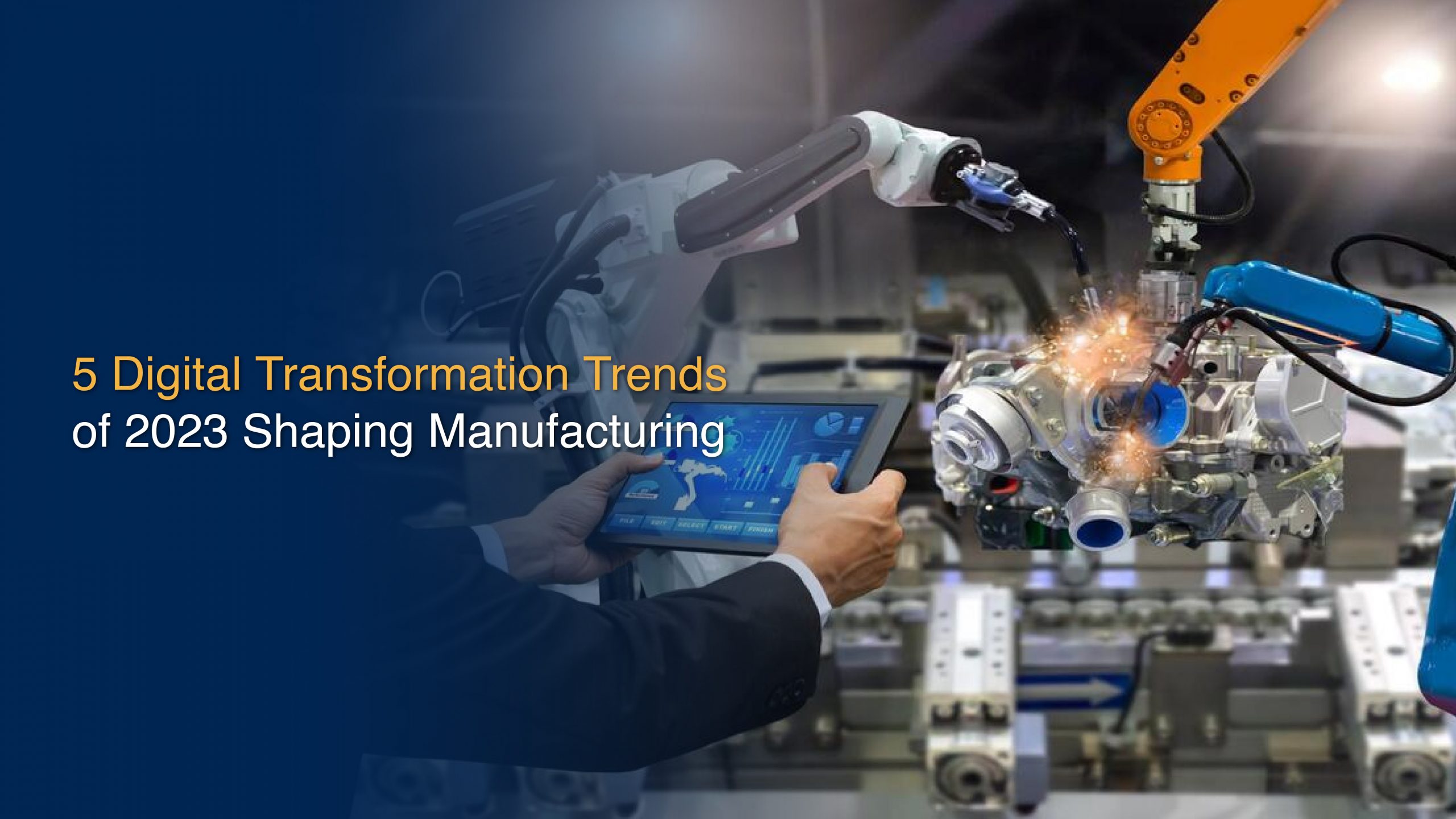
5 Digital Transformation Trends of 2023 Shaping Manufacturing
Stage Rejigdigital
In today’s times, digital transformation is not a choice for manufacturing anymore. It has become a necessity as it helps in exploring limitless opportunities to grow and gain a competitive advantage in the market. Implementing digital transformation solutions can enable companies to enhance productivity and efficiency. Manufacturers should keep on innovating their business to keep up with the changes taking place in the market.
As gradually manufacturing is going digital, higher customer expectations, increased connectivity, and technological improvements are some prime catalysts for this ongoing digital transformation in this industry. Digital Transformation provides long-term benefits which most companies are aware of. Enhanced efficiency, optimized data use, increased scope of innovation, and overall cost reduction are some of the perks of digital transformation.
To digitally transform the manufacturing sector, you need to know the latest trends. Let’s move ahead and read about these trends.
Digital Transformation Trends in Manufacturing
It is one of the best times for the manufacturing industry because so many emerging technologies keep arriving. Many companies are shifting to advanced technology to automate their manual processes. The year 2023 continues to follow the digital transformation trends set in manufacturing.
Let’s take a look at the 5 digital transformation trends to watch for in 2023.
-
Industrial IoT
Industrial IoT solutions involve smart sensors and actuators to improve manufacturing operations. IIoT leverages intelligent devices and real-time analytics to drive informed business decisions faster.
The network of smart and connected devices can monitor, collect, exchange, and interpret data. These devices can be utilized in the field, at factories, or in various remote locations. The data collected via sensors are further processed into actionable insights. These insights are beneficial for optimizing industrial operations, improving efficiency, and predictive maintenance.
One of the biggest benefits of Industrial IoT is remote monitoring and predictive maintenance. Since technicians cannot always arrive on-site quickly, they can monitor equipment performance and identify issues from remote locations to determine potential solutions. The early identification of issues can reduce downtime and extend the life of assets.
-
Predictive Maintenance
Most manufacturing units face losses due to disturbances in the production schedule caused by unexpected equipment downtime. Manufacturing facilities need to execute the best operational practices to improve the efficiency and availability of their assets and types of machinery. Predictive maintenance can decrease unexpected outages and extend the lifetime of your assets.
Data collected through IoT technology offers valuable predictive analytics that can help get a better understanding of asset performance. These insights help companies to take action beforehand to prevent machine breakdown and avoid disruptions in the production cycle. Eventually, it will save time, money, and resources for enterprises.
Also Read : 5 Noteworthy Benefits of Industrial IoT in Manufacturing
-
Artificial Intelligence and Machine Learning
Businesses produce a ton of data each day. Unfortunately, Only a small percentage of the data is available to use. However, the manufacturing sector is gradually realizing its importance. Most organizations are investing in technologies that can process large volumes of data accurately and in real time. With the integration of Artificial Intelligence (AI) and Machine Learning (ML) in their applications, infrastructure, and overall services, manufacturers are accelerating their data processing and making it more efficient.
Digital transformation through AI and MI is making industries robust as they streamline and automate various tedious operations. It helps in processing large volumes of data accurately and empowers manufacturers to deliver products faster, decrease costs, and reduce waste.
-
3D Printing
3D Printing is not a new innovation as it has been around for a long time. It is one of the most transformative manufacturing industry solutions in recent years. Enterprises across industries are using 3D printing to produce novel products. This process involves the creation of objects from digital data. It involves lasers to spread coatings of material, which hardens and results in an object. 3D printing can be used for making spares or entire products.
Manufacturers utilize 3D Printing to develop prototypes. It is an efficient way of developing new products and troubleshooting issues before mass production. Earlier, it would have taken months to develop the spares needed for mass production. However, the same can be completed in a few days. In a way, it has transformed the tedious and costly process of tooling.
-
Augmented and Virtual Reality
Augmented Reality (AR) enhances the user’s surroundings by adding digital components in a live view. Whereas, Virtual Reality (VR), replaces real-life environments with simulated one as the user is completely immersed in a digital environment.
Both these technologies are utilized in manufacturing to enhance business processes and improve efficiency. The manufacturing sector is leveraging these 2 technologies to create a more comprehensive and collaborative environment. It enables teams to share design, set up manufacturing lines, optimize ideas, and interact with machinery from anywhere in the world.
As manufacturers explore new designs and functionality, AR and VR can help predict possible issues and defects in real time. Issues like line layout working with product design or missing any step in the building process are easily identifiable with AR and VR. Recognizing potential issues in real time can save time and money.
Wrapping Up
It is an opportunity for manufacturers to leverage these emerging technologies to make production smarter and faster than before. With a variety of technologies available in the market today, the manufacturing sector can do a lot. As times are changing, manufacturers are integrating solutions that help them to automate business operations and leverage the potential of advanced technologies to drive innovation.
Rejig Digital is your trusted partner to enable digital transformation. We cater to a wide variety of industries including manufacturing, automotive, BFSI, chemicals, FMCG, healthcare, pharma, power, and transportation. Our proficiency in advanced technologies such as IIoT and AR can empower your business to produce desirable results.
